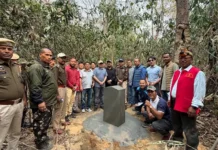[ Suresh Mohanty ]
India’s stature in the global community has witnessed a significant upswing in recent years. The Mexican president suggested to PM Modi along with Pope Francis to be in a panel for global truce. There has been wider western acceptance (albeit grudgingly) of India’s stand on the Russia-Ukraine conflict, despite substantial import of Russian oil and repeated abstention at UN resolutions specifically condemning Russia for the invasion. This is a manifestation of India’s growing importance in global diplomatic discourse. The German ambassador to India, Dr Philipp Ackermann said, “India buying oil from Russia is none of our business,” – a sentiment shared by even the US, which justified Indian import of Russian oil facilitating Western price cap. Incidentally, EU continued to purchase Russian goods worth $186 bn between March 2022 and January 2023 all through the war and now Japan plans to buy Russian oil at a higher price than the price cap.
PM Modi has even earned praise from unexpected quarters, including China, where netizens called him Modi Laoxian meaning ‘Modi the immortal’ and Pakistan. Indian vaccine maitri initiative (as against western countries who procured nearly 60 percent of the Covid-19 vaccines to vaccinate their citizens multiple number of times), reaching out to neighbours in economic distress and evacuation of nearly 20,000 citizens from war-torn Ukraine under Operation Ganga earned it worldwide acclaim. The robust and resilient economic resurgence post the pandemic vis-à-vis the otherwise gloomy situation in the rest of the world, has major economies making a beeline for investment in India post the supply chain disruption in China.
India must use this unique opportunity in the prevailing geo-strategic biosphere to shape the immediate neighborhood to secure its long-term strategic security and economic interests, before the Saudi-Iranian rapprochement initiative by China in the Middle East manifests itself in the closer neighbourhood. Through its neighborhood first policy, reflective in its vaccine diplomacy (assistance to over 90 countries), assistance during natural disasters and economic assistance to debt trapped neighbours, India has displayed assertive diplomatic state craft through commitment and assured delivery. The time now is critical in the backdrop of economic headwinds in Sri Lanka, Bangladesh, political turmoil in Nepal and ‘positive consensus’ to expedite border negotiations between Bhutan and China.
Constrained by the deleterious effect of zero Covid policy, economic turndown, rapidly deteriorating relations with the US and threats to its long-cherished desire for unification of Taiwan, China has been reluctant in debt restructuring for IMF bailout for Sri Lanka and less than encouraging assistance to its all-weather friend Pakistan that underscores its credibility deficit.
Nepal
Nepal resents its over dependence on India due to its geographical isolation, made worse by perceived Madhesi economic blockade and meddling in its domestic affairs. It feels that the jan andolans, Maoist insurgency and Madhesi agitations were triggered by India. The relationship underpinned by the 1950 Treaty of Peace and Friendship, touched its lowest point consequent to inauguration of Road Dharchula-Lipulekh pass in May 2020 and Nepal releasing an amended political map showing disputed areas of Lipulekh, Kalapani and Limpiyadura as part of its territory. To wean away Nepal from its overdependence on India and as part of its BRI project, China has offered three land and four sea ports to Nepal over 4,000 kms away on its east coast as against access to the Bay of Bengal, just 700 kms away.
In addition, the railway line from Kerung in South Tibet to Kathmandu will have security ramifications for India. India must take proactive steps to reset its relationship with Nepal against the backdrop of failed Chinese experiment of uniting the disparate communist parties and border incursions in Humla district of western Nepal, authenticated by its own government investigation. Prime Minister Modi’s visit to Lumbini in May 2022 was a refreshing cultural and religious connect. We need to take advantage of historic people-to-people contacts, over a lakh defence pensioners and geographic advantages of trade and access to the sea, rather than Nepal having to choose an unnatural partner across the Himalayan barrier.
Bhutan
The Indo-Bhutan relationship is shaped by the 1949 Treaty of Friendship and Cooperation (revised in 2007), that is based on trust, goodwill and mutual understanding. The 2017 Doklam standoff between India and China and the memorandum of understanding as a three-step roadmap for expediting China-Bhutan border issues signed between Bhutan and China in October 2021 have sought to disturb this relationship with serious security implications for India in the vicinity of Siliguri corridor.
Unsure of India’s economic, diplomatic and military heft in the event of a belligerent Chinese territorial expansionism, Bhutan may possibly wilt and make territorial concessions to the detriment of India’s core security interests. The recent visit of the king of Bhutan to India against the backdrop of statement by its PM that China has equal say in resolving boundary disputes at the trijunctions must be seen in this light.
India must preempt any Bhutanese border agreement with China and an agreement at both trijunctions (India-Bhutan-Tibet and India-Myanmar-Tibet) must take into consideration the security concerns of India. Mao’s five finger strategy (Ladakh, Sikkim, Nepal, Bhutan, Arunachal Pradesh) is not lost on any of its neighbours, given the forcible annexation of Tibet in 1951.
While Bhutan must exercise its sovereign space for diplomatic and economic autonomy, the core security interests of India must be taken into account.
Sri Lanka
The India-Sri Lankan relationship has weathered the turbulent phase of LTTE insurgency and ignominious withdrawal of the Indian Peace Keeping Force. India has not only reached out to the beleaguered Island nation during its most calamitous economic hardship in 2022, but has made consistent effort to prevail on the IMF for a bailout package when the economic predator China has placed conditionalities. The time is now ripe for restoration of age-old mutually beneficial relationship between India and Sri Lanka.
While Sri Lanka has to be sensitive to India’s security concerns of PLA vessels, including submarines, visiting its ports, India must display greater maturity and understanding in pushing through the 13th amendment for greater autonomy to the Tamils, restrain fishermen from venturing into Sri Lanka territorial waters and further strengthen its military-to-military relationship.
Bangladesh
The India-Bangladesh relations have witnessed significant bonhomie ever since Prime Minister Shaikh Hasina has been in power since 2009 due to its restraint over Islamic fundamentalism and punitive action against insurgent groups operating from Bangladesh soil against India’s Northeast. This has been further solidified by the Land Border Agreement in 2015 where in India gave up sovereignty over 111 enclaves in favour of Bangladesh against 51.
However, continuing irritants of the Teesta river water sharing, infiltration and cattle smuggling, the Rohingya crisis, drug trafficking and Chinese infrastructure development close to Indian borders are continuing irritants.
Cooperation in the fields of trade, defence, connectivity and mutual security interests would have to be the cornerstone of a thriving relationship. Being a bigger and more powerful neighbour, India needs to make compromises to accommodate Bangladesh’s core concerns. Concurrently, India must secure a transit corridor through Bangladesh to its northeastern states through a mutually beneficial protocol.
Myanmar
With nearly two years into the military coup in Myanmar, the internal unrest in Myanmar only tends to become more complex and return to democratic governance nowhere in sight. The recent announcement by the military junta to dissolve nearly 40 political parties for failing to register only makes it worse. From a peaceful civil disobedience movement against the ‘Tatmadaw’, it has metamorphosed into armed guerrilla movement by the Peoples Defence Forces (PDF) and armed ethnic organisations.
While India shares a peaceful and well-demarcated border with Myanmar (except the 136 km in the India-Tibet-Myanmar trijunction), the insurgent camps located close to the IMB in Myanmar continue to enjoy state patronage. The Myanmar Army seems unconcerned and disinclined to operate against the training camps as a quid pro quo in maintaining internal order. Caught between support to the democratic movement and engagement with Myanmar Army, India is unable to act against insurgents operating from its soil.
The Chinese inroads into Myanmar in the form of China-Myanmar Economic Corridor and operationalisation of Kyaukphyu port as part of its two-ocean theory as also covert support to Northeast insurgents are areas of India’s concern. While continuing to support the people of Myanmar economically, India must use its diplomatic leverage to ensure return to normalcy and action against insurgent camps located close to the borders.
Pakistan
The India-Pakistan relations have continued to remain in a state of frozen animosity and are likely to remain so as long as Pakistan continues to employ terrorism as an instrument of state policy against India. The current precarious economic, political and security situation is likely to further accelerate its slide into anarchy. It requires a popular people’s movement in Pakistan to change its perception towards India. India must reach out to the people of Pakistan through purely humanitarian aid and expose the debilitating policies of their government and the army.
Time and tide both are on India’s side and it must seize this opportunity to evolve an ‘Indian Marshall Plan’ to shape the neighborhood to secure its long-term strategic interests. The contestations of wooing the neighbours through economic, diplomatic and security overtures will be the order of the day in the rapidly changing regional and global power dynamics. The cornerstone of our neighbourhood policy must be based on mutual interest, mutual sensitivity and mutual accommodation sans reciprocity and not merely to balance out China’s predatory expansionism. (Maj Gen Suresh Chandra Mohanty is security adviser to GoAP.)


